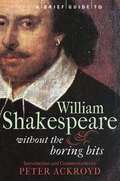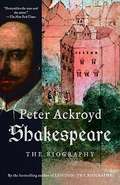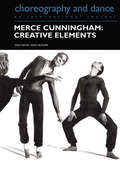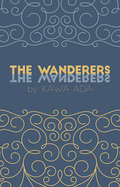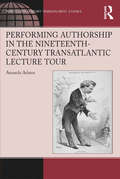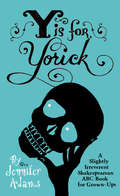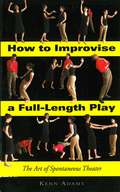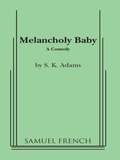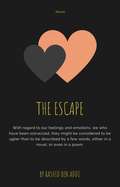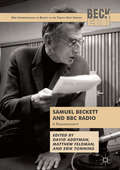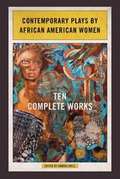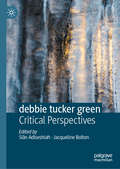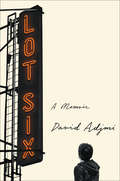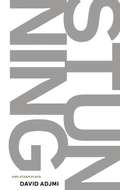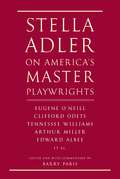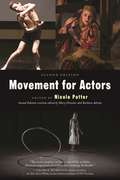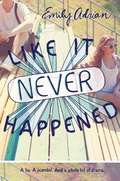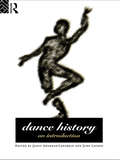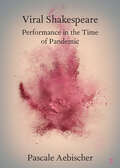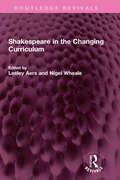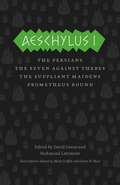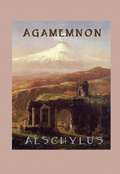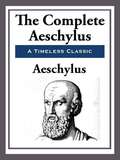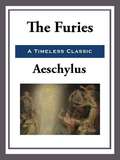- Table View
- List View
A Brief Guide to William Shakespeare (Brief Histories)
by Peter AckroydAn accessible and entertaining journey through the life, times, and work of the Bard - Enigma. Master of language. The greatest comedian in history? The most famous writer in the world. But isn't he a little bit boring? This is an essential guide for anyone who has previously avoided the Bard, and is the perfect introduction for first time students or seasoned theatre lovers. The book contains a full commentary of all the plays by bestselling and reknowned writer Peter Ackroyd as well as full descriptions of the cast and the drama; not forgetting the best speeches, and the wit and wisdom from across the works. There is also an opportunity to explore the poems and a complete set of sonnets, as well as an investigation of who the dark lady might have been.Contains:The complete sonnets; the greatest speeches; the best lines.Perfect for students struggling through their first play or for theatre lovers anywhere.Entertaining, accessible, Shakespeare without the boring bits.
Shakespeare: The Biography
by Peter AckroydThis is the big one from Peter Ackroyd — and a worthy companion toLondon: The Biography. Only Peter Ackroyd can combine readable narrative and unique observation with a sharp eye for the fascinating fact. His method is to position Shakespeare in the close context of his world. In this way, he not only richly conjures up the texture of Shakespeare’s life, but also imparts an amazing amount of vivid, interesting material about place, period and background. Some snippets: Shakespeare was secretly a Roman Catholic; the witches in Macbeth were not hags but nymphs played by boys; the “best” bed was for guests which was why he bequeathed his wife his “second best” bed (the matrimonial bed in which he probably died); “ham acting” derives from the strutting walk which showed off the ham-strings; an actor called “Will” played female parts — could it have been Shakespeare himself? And, the strongest bond in the plays is between father and daughter, perhaps reflecting Shakespeare’s own family life. From the Hardcover edition.
Merce Cunningham: Creative Elements (Choreography and Dance Studies Series #Vols. 4, Pts. 2.)
by Joan Acocella David Vaughan Gordon Mumma Thecla Schiphorst William Fetterman Elliot Caplan Marilyn Vaughan Drown John Holzaepfel Nelson RiveraMerce Cunningham reached the age of 75 in 1994, an age at which many creative artists are content to rest on their laurels, or at least to leave behind whatever controversies they may have caused during their careers. No so Cunningham. In the first place, his 70s have been a time of intense creativity in which he has choreographed as many as four new works a year. Cunningham is a strongly committed as ever to the discovery of new ways of moving and of making movement, refusing to be hampered by the physical limitations that have come with age. Since 1991 every new work has been made at least in part with the use of the computer program Life Forms, which enables him to devise choreographic phrases that he himself would be unable to perform - and which challenge and develop the virtuosity of the young dancers in his company.The essays collected in this special issue of Choreography and Dance were written over the last few years and discuss various aspects of the work of Cunningham as seen both from the outside and the inside.
The Wanderers
by Kawa AdaAs the Soviet army invades Afghanistan, Aman and Mariam flee to Canada in hopes of putting an ocean between themselves and the daily horrors of war. A championship chess player in Kabul, Aman finds himself working in a pizzeria just to get by. Their fresh start continues to prove difficult as they navigate the trauma and displacement that follows them at every turn, and when their son Roshan is born, their curse of displacement is passed on to the next generation. The family’s only hope for a peaceful future might be Mariam’s past, as her family mythology becomes a source of power. Is her love strong enough to keep Aman and Roshan from destroying themselves or each other?
Performing Authorship in the Nineteenth-Century Transatlantic Lecture Tour (Ashgate Series in Nineteenth-Century Transatlantic Studies)
by Amanda AdamsExpanding our understanding of what it meant to be a nineteenth-century author, Amanda Adams takes up the concept of performative, embodied authorship in relationship to the transatlantic lecture tour. Adams argues that these tours were a central aspect of nineteenth-century authorship, at a time when authors were becoming celebrities and celebrities were international. Spanning the years from 1834 to 1904, Adams’s book examines the British lecture tours of American authors such as Frederick Douglass, Harriet Beecher Stowe, and Mark Twain, and the American lecture tours of British writers that include Harriet Martineau, Charles Dickens, Oscar Wilde, and Matthew Arnold. Adams concludes her study with a discussion of Henry James, whose American lecture tour took place after a decades-long absence. In highlighting the wide range of authors who participated in this phenomenon, Adams makes a case for the lecture tour as a microcosm for nineteenth-century authorship in all its contradictions and complexity.
Y is for Yorick: A Slightly Irreverent Shakespearean Abc Book For Grown-ups
by Jennifer AdamsThis delightfully illustrated ABC book for grown-ups offers a fresh and irreverent take on Shakespeare&’s most memorable characters. The plays of William Shakespeare contain some of the most renowned characters and stories in all of literature. The perfect gift for any fan of The Bard, Y is for Yorick takes playful jabs at the unforgettable plots and people we all know and love. From Ariel (of The Tempest) to Elizabeth (of Richard III), each entry combines amusing illustrations with tongue-in-cheek captions about each character.
How to Improvise a Full-Length Play: The Art of Spontaneous Theater
by Kenn AdamsForget the script and get on the stage! In How to Improvise a Full-Length Play, actors, playwrights, directors, theater-group leaders, and teachers will find everything they need to know to create comedy, tragedy, melodrama, and farce, with no scripts, no scenarios, and no preconceived characters. Author Kenn Adams presents a step-by-step method for long-form improvisation, covering plot structure, storytelling, character development, symbolism, and advanced scene work. Games and exercises throughout the book help actors and directors focus on and succeed with cause-and-effect storytelling, raising the dramatic stakes, creating dramatic conflict, building the dramatic arc, defining characters, creating environments, establishing relationships, and more. How to Improvise a Full-Length Play is the essential tool for anyone who wants to create exceptional theater.
Melancholy Baby
by Sheila K. AdamsAll Groups / Comedy / 4 m., 3 f. 1 f. child. / Interior / Kate Gaitman, a soap opera villainess, comes home from yet another morning of mass murder at the studio to find her husband has lost the latest in a long line of jobs. She kicks him out of the apartment just as nervous cousin Stephen is entering for a reading of her long lost father's will. And what did daddy leave Katie and her two irresponsible sisters? Jane: a twelve year old with a mind of her own who wants to be a night club singer just like Sinatra.
The Escape: The Escape
by Rashid Ben AddiIt is the cry of a whole generation, unable to get out of the cycle of inertia, and still sees the ray of hope coming from behind the border When we are assured of the low level of images that were exposing the boats of death that lead the young to die, just as butterflies go to the Holocaust and follow the beam of light, shaking the narrator reassured, and tells us that death boats are still fine It is only the destination of the butterflies that have differed, but their burning is still going on in front of the sight of a homeland that is in dire need of its wings and its lava, which withers without price. Young people flee to bars and endless hell, or sink into the belly of the Ghoul, to become a hand to strike terrorism, or leave to Turkey, and cut all ties to the homeland .. <P><P>Or live endless dreams of escape may be in the coffin, may be a reminder to America For eternal migration And if all these manifestations of escape, lived by one hero, is "Yazid" hero of the novel, but in fact pictures of a whole generation, feels that he is outcast, and does not trust much that anyone will reach the truth of his feelings, so the young writer from the beginning anger In Manfesto opens his novel and says: Our feelings and feelings we are outcasts, uglier than words described in a novel or even in a poem Let the novel begin with infinite circles from Taha, Rabat, that harsh city. <P><P>The bus is scattered between the bus (life), the cafe, and the sea The dream of a revolution comes fleeting, not for a better tomorrow, but for equal losses, or to lose the winners in this grim reality At the peak of despair lies the false hope more than once, on the establishment of a dream, or promise a way worse than the current way. Hope may appear in the spectrum of a woman appearing and disappearing, or in the pregnancy of a child aborting harshly, and remains just a painful memory, or loss added to the rest of the losses Even after escaping to Turkey, fate continues to play with a desperate yo
Samuel Beckett and BBC Radio
by David Addyman Matthew Feldman Erik TonningThis book is the first sustained examination of Samuel Beckett's pivotal engagements with post-war BBC radio. The BBC acted as a key interpreter and promoter of Beckett's work during this crucial period of his "getting known" in the Anglophone world in the 1950s and 1960s, especially through the culturally ambitious Third Programme, but also by the intermediary of the house magazine, The Listener. The BBC ensured a sizeable but also informed reception for Beckett's radio plays and various "adaptations" (including his stage plays, prose, and even poetry); the audience that Beckett's works reached by radio almost certainly exceeded in size his readership or theatre audiences at the time. In rethinking several key aspects of his relationship with the BBC, a mix of new and familiar Beckett critics take as their starting point the previously neglected BBC radio archives held at the Written Archive Centre in Caversham, Berkshire. The results of this extended reassessment are timely and, in many cases, quite surprising--for readers of Beckett and for scholars of radio, "late modernism," and post-war British culture more broadly.
Contemporary Plays by African American Women: Ten Complete Works
by Sandra AdellAfrican American women have increasingly begun to see their plays performed from regional stages to Broadway. Yet many of these artists still struggle to gain attention. In this volume, Sandra Adell draws from the vital wellspring of works created by African American women in the twenty-first century to present ten plays by both prominent and up-and-coming writers. Taken together, the selections portray how these women engage with history as they delve into--and shake up--issues of gender and class to craft compelling stories of African American life. Gliding from gritty urbanism to rural landscapes, these works expand boundaries and boldly disrupt modes of theatrical representation. Selections: Blue Door , by Tanya Barfield; Levee James , by S. M. Shephard-Massat; Hoodoo Love , by Katori Hall; Carnaval , by Nikkole Salter; Single Black Female , by Lisa B. Thompson; Fabulation, or The Re-Education of Undine , by Lynn Nottage; BlackTop Sky , by Christina Anderson; Voyeurs de Venus , by Lydia Diamond; Fedra , by J. Nicole Brooks; and Uppa Creek: A Modern Anachronistic Parody in the Minstrel Tradition , by Keli Garrett.
debbie tucker green: Critical Perspectives
by Siân Adiseshiah Jacqueline BoltonThis long-awaited book is the first full-length study of the work of the extraordinary contemporary black British playwright, debbie tucker green. Covering the period from 2000 (Two Women) to 2017 (a profoundly affectionate, passionate devotion to someone (-noun)), it offers scholars and students the opportunity to engage in cutting-edge critical debate engendered by tucker green’s innovative dramatic works for stage, television, and radio. This groundbreaking book includes contributions by a range of outstanding scholars, including black playwriting specialists, world-leading contemporary theatre scholars and some of the very best emerging researchers in the field. While always focused on the precision and detail of tucker green’s work, this book simultaneously reframes broader debates around contemporary drama and its politics, poses new questions of theatre, and provokes scholarly thinking in ways that, however obliquely, contribute to the change for which the plays agitate.
Lot Six: A Memoir
by David Adjmi“David Adjmi has written one of the great American memoirs, a heartbreaking, hilarious story of what it means to make things up, including yourself. A wild tale of lack and lies, galling humiliations and majestic reinventions, this touching, coruscating joy of a book is an answer to that perennial question: how should a person be?” — Olivia Laing, author of Crudo and The Lonely CityIn a world where everyone is inventing a self, curating a feed and performing a fantasy of life, what does it mean to be a person? In his grandly entertaining debut memoir, playwright David Adjmi explores how human beings create themselves, and how artists make their lives into art. Brooklyn, 1970s. Born into the ruins of a Syrian Jewish family that once had it all, David is painfully displaced. Trapped in an insular religious community that excludes him and a family coming apart at the seams, he is plunged into suicidal depression. Through adolescence, David tries to suppress his homosexual feelings and fit in, but when pushed to the breaking point, he makes the bold decision to cut off his family, erase his past, and leave everything he knows behind. There's only one problem: who should he be? Bouncing between identities he steals from the pages of fashion magazines, tomes of philosophy, sitcoms and foreign films, and practically everyone he meets—from Rastafarians to French preppies—David begins to piece together an entirely new adult self. But is this the foundation for a life, or just a kind of quicksand? Moving from the glamour and dysfunction of 1970s Brooklyn, to the sybaritic materialism of Reagan’s 1980s to post-9/11 New York, Lot Six offers a quintessentially American tale of an outsider striving to reshape himself in the funhouse mirror of American culture. Adjmi’s memoir is a genre bending Künstlerroman in the spirit of Charles Dickens and Alison Bechdel, a portrait of the artist in the throes of a life and death crisis of identity. Raw and lyrical, and written in gleaming prose that veers effortlessly between hilarity and heartbreak, Lot Six charts Adjmi’s search for belonging, identity, and what it takes to be an artist in America.
Stunning and Other Plays
by David Adjmi"Nearly everything about David Adjmi's Stunning has an original ring to it, from the setting . . . to the brassy bleat of the dialogue." -Time Out New YorkThis volume of distinctive work includes Stunning, set in an insular Syrian Jewish community, where a teenage bride's world is disrupted by her intellectual African American housekeeper; Evildoers, about the collapse of two privileged couples; and Elective Affinities, a post-9/11 monologue.David Adjmi's work has been produced at Lincoln Center Theatre, Yale Repertory Theatre, Woolly Mammoth, and the Royal Court in London. He has received numerous commissions and is the recipient of a 2009 Kesselring Fellowship and a Bush Artist Fellowship.
Stella Adler on America's Master Playwrights: Eugene O'Neill, Thornton Wilder, Clifford Odets, William Saroyan, Tennessee Williams, William Inge, Arthur Miller, Edward Albee
by Stella AdlerIn her long-awaited book, the legendary acting teacher Stella Adler gives us her extraordinary insights into the work of Henrik Ibsen ("The creation of the modern theater took a genius like Ibsen . . . Miller and Odets, Inge and O'Neill, Williams and Shaw, swallowed the whole of him"), August Strindberg ("He understood and predicted the forces that would break in our lives"), and Anton Chekhov ("Chekhov doesn't want a play, he wants what happened in life. In life, people don't usually kill each other. They talk"). Through the plays of these masters, Adler discusses the arts of playwriting and script interpretation ("There are two aspects of the theater. One belongs to the author and the other to the actor. The actor thinks it all belongs to the author . . . The curtain goes up and all he knows are the lines . . . It is not enough . . . Script interpretation is your profession"). She looks into aspects of society and class, and into our cultural past, as well as the evolution of the modern spirit ("The actor learns from Ibsen what is modern in the modern theater. There are no villains, no heroes. Ibsen understands, more than anything, there is more than one truth"). Stella Adler--daughter of Jacob Adler, who was universally acknowledged to be the greatest actor of the Yiddish theater, and herself a disciple of Stanislavsky--examines the role of the actor and brings to life the plays from which all modern theater derives: Ibsen's Hedda Gabler, The Master Builder, An Enemy of the People, and A Doll's House; Strindberg's Miss Julie and The Father; Chekhov's The Seagull, Uncle Vanya, The Cherry Orchard, and Three Sisters ("Masha is the sister who is the mystery. You cannot reach her. You cannot reach the artist. There is no logical way. Keep her in a special pocket of feelings that are complex and different"). Adler discusses the ideas behind these plays and explores the world of the playwrights and the history--both familial and cultural--that informed their work. She illumines not only the dramatic essence of each play but its subtext as well, continually asking questions that deepen one's understanding of the work and of the human spirit. Adler's book, brilliantly edited by Barry Paris, puts her famous lectures into print for the first time.
Movement for Actors
by Barbara Adrian Mary Fleischer Nicole PotterIn this updated rich resource for actors, renowned movement teachers and directors reveal the physical skills needed for the stage and the screen. Readers will gain remarkable insights into the physical skills and techniques used in a wide variety of performance styles through ready-to-use exercises and approaches. Included in this new edition are chapters covering:Stage combatYoga for actorsMartial artsBody-mind centeringAuthentic movementBartenieff fundamentalsGrotowski-based movementThose who want to pursue serious training will be able to consult the appendix for listings of the best teachers and schools in the country. This inspiring collection is a must-read for all actors, directors, and teachers of theater looking for stimulation and new approaches.Allworth Press, an imprint of Skyhorse Publishing, publishes a broad range of books on the visual and performing arts, with emphasis on the business of art. Our titles cover subjects such as graphic design, theater, branding, fine art, photography, interior design, writing, acting, film, how to start careers, business and legal forms, business practices, and more. While we don't aspire to publish a New York Times bestseller or a national bestseller, we are deeply committed to quality books that help creative professionals succeed and thrive. We often publish in areas overlooked by other publishers and welcome the author whose expertise can help our audience of readers.
Like It Never Happened
by Emily AdrianStereotypes, sexuality, and destructive rumors collide in this smart YA novel for fans of Sara Zarr's Story of a Girl, Siobhan Vivian's The List, and E. Lockhart's The Disreputable History of Frankie Landau-Banks.When Rebecca Rivers lands the lead in her school's production of The Crucible, she gets to change roles in real life, too. She casts off her old reputation, grows close with her four rowdy cast-mates, and kisses the extremely handsome Charlie Lamb onstage. Even Mr. McFadden, the play's critical director, can find no fault with Rebecca.Though "The Essential Five" vow never to date each other, Rebecca can't help her feelings for Charlie, leaving her both conflicted and lovestruck. But the on and off-stage drama of the cast is eclipsed by a life-altering accusation that threatens to destroy everything...even if some of it is just make believe.
Dance History: An Introduction
by Janet Adshead-Lansdale June LaysonOriginally published in 1983 the first edition rapidly established itself as a core student text. Now fully revised and up-dated it remains the only book to address the rationale, process, techniques and methodologies specific to the study of dance history. For the main body of the text which covers historical studies of dance in its traditional and performance contexts, the editors have brought together a team of internationally known dance historians. Roger Copeland and Deborah Jowitt each take a controversial look at the modern American dance. Kenneth Archer and Millicent Hodson explain the processes they use when reconstructing 'lost' ballets, and Theresa Buckland and Georgina Gore write on traditional dance in England and West Africa respectively. With other contributions on social dance, ballet, early European modern dance and feminist perspectives on dance history this book offers a multitude of starting points for studying dance history as well as presenting examples of dance writing at its very best. Dance History will be an essential purchase for all students of dance.
Screening Early Modern Drama
by Pascale AebischerWhile film adaptations of Shakespeare's plays captured the popular imagination at the turn of the last century, independent filmmakers began to adapt the plays of Shakespeare's contemporaries. The roots of their films in European avant-garde cinema and the plays' politically subversive, sexually transgressive and violent subject matter challenge Shakespeare's cultural dominance and the conventions of mainstream cinema. In Screening Early Modern Drama, Pascale Aebischer shows how director Derek Jarman constructed an alternative, dissident, approach to filming literary heritage in his 'queer' Caravaggio and Edward II, providing models for subsequent filmmakers such as Mike Figgis, Peter Greenaway, Alex Cox and Sarah Harding. Aebischer explains how the advent of digital video has led to an explosion in low-budget screen versions of early modern drama. The only comprehensive analysis of early modern drama on screen to date, this groundbreaking study also includes an extensive annotated filmography listing forty-eight surviving adaptations.
Viral Shakespeare: Performance in the Time of Pandemic (Elements in Shakespeare Performance)
by Pascale AebischerThis Element offers a first-person phenomenological history of watching productions of Shakespeare during the pandemic year of 2020. The first section of the Element explores how Shakespeare 'went viral' during the first lockdown of 2020 and considers how the archival recordings of Shakespeare productions made freely available by theatres across Europe and North America impacted on modes of spectatorship and viewing practices, with a particular focus on the effect of binge-watching Hamlet in lockdown. The Element's second section documents two made-for-digital productions of Shakespeare by Oxford-based Creation Theatre and Northern Irish Big Telly, two companies who became leaders in digital theatre during the pandemic. It investigates how their productions of The Tempest and Macbeth modelled new platform-specific ways of engaging with audiences and creating communities of viewing at a time when, in the UK, government policies were excluding most non-building-based theatre companies and freelancers from pandemic relief packages.
Shakespeare in the Changing Curriculum (Routledge Revivals)
by Lesley Aers Nigel WhealeFirst published in 1991, Shakespeare in the Changing Curriculum provides a context for debates about the place of Shakespeare within the English curriculum in the 1990s, and examines the possibilities in teaching Shakespeare afforded by the application of contemporary critical approaches, such as communication, cultural and gender studies, in the classroom and seminar room. The collection will be of particular to interest to sixth-form students, secondary school teachers, teacher trainers and students and lecturers in further and higher education.
Aeschylus I: The Persians, The Seven Against Thebes, The Suppliant Maidens, Prometheus Bound (The Complete Greek Tragedies)
by AeschylusAeschylus I contains “The Persians,” translated by Seth Benardete; “The Seven Against Thebes,” translated by David Grene; “The Suppliant Maidens,” translated by Seth Benardete; and “Prometheus Bound,” translated by David Grene. Sixty years ago, the University of Chicago Press undertook a momentous project: a new translation of the Greek tragedies that would be the ultimate resource for teachers, students, and readers. They succeeded. Under the expert management of eminent classicists David Grene and Richmond Lattimore, those translations combined accuracy, poetic immediacy, and clarity of presentation to render the surviving masterpieces of Aeschylus, Sophocles, and Euripides in an English so lively and compelling that they remain the standard translations. Today, Chicago is taking pains to ensure that our Greek tragedies remain the leading English-language versions throughout the twenty-first century. In this highly anticipated third edition, Mark Griffith and Glenn W. Most have carefully updated the translations to bring them even closer to the ancient Greek while retaining the vibrancy for which our English versions are famous. This edition also includes brand-new translations of Euripides’ Medea, The Children of Heracles, Andromache, and Iphigenia among the Taurians, fragments of lost plays by Aeschylus, and the surviving portion of Sophocles’s satyr-drama The Trackers. New introductions for each play offer essential information about its first production, plot, and reception in antiquity and beyond. In addition, each volume includes an introduction to the life and work of its tragedian, as well as notes addressing textual uncertainties and a glossary of names and places mentioned in the plays. In addition to the new content, the volumes have been reorganized both within and between volumes to reflect the most up-to-date scholarship on the order in which the plays were originally written. The result is a set of handsome paperbacks destined to introduce new generations of readers to these foundational works of Western drama, art, and life.
Agamemnon
by AeschylusAeschylus' Agamemnon, first produced in 458 BC, is the opening play in his Oresteian trilogy. Agamemnon returns home after the Trojan Wars with his concubine Cassandra and is murdered by his wife Clytemnestra and her lover, Aegisthus. The ensuing blood feud continues until the third and final play, Eumenides, when peace is finally restored to the house of the Atreidae. It is a powerful and moving play which is difficult to interpret and which for a long time lacked an English edition.
The Complete Aeschylus
by AeschylusAeschylus' Oresteia, the only ancient tragic trilogy to survive, is one of the great foundational texts of Western culture. It begins with Agamemnon, which describes Agamemnon's return from the Trojan War and his murder at the hands of his wife Clytemnestra, continues with her murder by their son Orestes in Libation Bearers, and concludes with Orestes' acquittal at a court founded by Athena in Eumenides. The trilogy thus traces the evolution of justice in human society from blood vengeance to the rule of law, Aeschylus' contribution to a Greek legend steeped in murder, adultery, human sacrifice, cannibalism, and endless intrigue.
The Furies
by AeschylusThis classic trilogy by the great tragedian deals with the bloody history of the House of Atreus. Grand in style, rich in diction and dramatic dialogue, the plays embody Aeschylus' concerns with the destiny and fate of both individuals and the state, all played out under the watchful eye of the gods.
